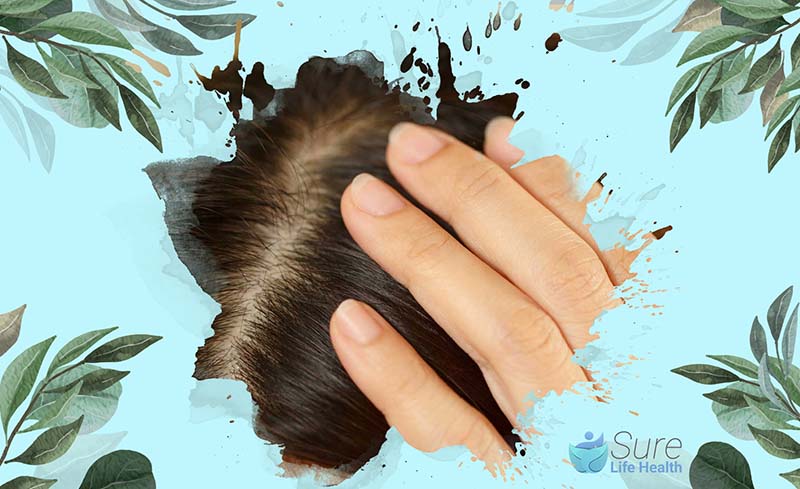Is rosemary water good for your hair? Increasingly, people are praising the benefits of rosemary water for promoting hair growth. But how effective is this natural remedy really?
In this detailed exploration, we examine the advantages of rosemary for hair health and reveal the most effective ways to use it. Additionally, we offer tips on other hair care techniques and explore further applications of rosemary water for maintaining beautiful, healthy locks.
Is Rosemary Water Good for Your Hair?
Rosemary water has several benefits that support a healthy scalp and hair follicles, promoting hair growth. It has anti-inflammatory and anti-microbial properties, which can help reduce conditions like dandruff and scalp psoriasis.
According to William Gaunitz, a certified trichologist and founder of the hair-growth brand Advanced Trichology, rosemary may help with hair growth as a cleanser and an antiseptic for the scalp. “When people have inflammation related to higher levels of oil and microorganisms, such as parasites, fungus, and bacteria, rosemary water may help clean the scalp and kill off some low levels of inflammatory microorganisms,” he says.
Research also supports the idea that rosemary water may promote hair growth. In a 2015 study, rosemary oil was shown to be as effective as minoxidil (the active ingredient in Rogaine) in increasing hair growth after six months of use.

Benefits of Rosemary Water for Your Hair
Rosemary water has become a popular natural remedy for various hair concerns. Its natural properties offer a range of benefits, from enhancing hair growth to improving hair texture. Here’s how rosemary water can be beneficial for your hair:
Rosemary Water Helps Clear Dandruff
The antifungal and anti-inflammatory properties of rosemary help combat dandruff. Regular use of rosemary water can maintain scalp health by reducing the yeast that contributes to dandruff and soothing scalp irritation that often comes with flaking and itching.

Rosemary Water Stimulates Hair Growth
Rosemary water is known for its ability to stimulate blood circulation to the scalp. This increased blood flow nourishes hair follicles, promoting faster and stronger hair growth.
Studies suggest that rosemary oil, which can be used to make rosemary water, is as effective as minoxidil, a common hair growth treatment, in treating hair loss.
Rosemary Water Helps Keep Hair Smooth
Rosemary water can also enhance the overall texture of your hair, making it smoother and more manageable. The nutrients in rosemary help to coat hair follicles, reducing frizz and adding a natural shine.
Regular rinsing with rosemary water after shampooing can leave your hair feeling softer and silkier.

Instructions for Making Rosemary Water Properly
Making rosemary water is extremely easy. With just two ingredients and a few minutes at the stove, you can create a fresh batch that will help your hair grow long and shiny.
Ingredients:
- 3 cups of water
- 2 sprigs of fresh rosemary
Steps:
- Bring 3 cups of water to a boil.
- Add the rosemary sprigs to the boiling water.
- Remove the pot from heat and cover it with a lid.
- Let the rosemary steep in the water until it cools completely, allowing it to release its beneficial properties into the water.
- Once cooled, transfer the rosemary water to a jar or spray bottle.
You can store the mixture in the fridge for up to 2 weeks. Consider making a larger batch to have on hand whenever your hair needs a boost.
How Often to Use Rosemary Water for Hair?
To get the full effects of rosemary water, use it regularly as part of your regular hair care routine. Start by applying it two or three times per week and adjust as needed. For many, it can take several weeks to start noticing changes in your hair.
With that said, everyone is different. If you find that the rosemary water irritates your skin, you might achieve similar results with a custom scalp mask.
The Downside of Using Rosemary Water for Hair
Rosemary water is generally safe to use and side effects are rare. However, there is also the possibility of potential problems.
- Contact Dermatitis: If symptoms of contact dermatitis, such as skin redness or irritation, appear, stop using rosemary water immediately and consult a healthcare provider.
- Allergy or Hypersensitivity: Do not use rosemary water if you have known allergies or hypersensitivity to rosemary or plants in the Lamiaceae or Labiatae family (mint).
- Pregnancy or Breastfeeding: Rosemary has potential hormone-altering activity and hasn’t been extensively tested on pregnant and breastfeeding individuals. Because of this, it is not recommended during pregnancy or breastfeeding.
- Possible Hair Darkening: Some users have reported their hair darkening or staining due to the color of rosemary water. For those with lighter-colored hair or those concerned about potential staining, use fewer rosemary leaves to create a less concentrated infusion or avoid using rosemary water altogether.
How to Use Rosemary Water for Hair
Rosemary water can be a delightful addition to your hair care routine, and there are several methods to apply it effectively:
- Direct Application: Fill a spray bottle with rosemary water and lightly mist it over your dry hair. Use a brush to evenly spread it from the roots down to the tips, ensuring full coverage.
- Post-Shampoo Application: After shampooing, while your hair is still damp, apply rosemary water. Comb it through to distribute evenly and then proceed with your usual drying routine.
- Deep Hydration: For an intensive hydration treatment, apply a generous amount of rosemary water to your hair. Allow it to penetrate the strands for a few minutes. After this soaking period, rinse it out thoroughly, dry your hair, and apply a hair oil to lock in the moisture as you style.

Other Ways to Use Rosemary Water
Rosemary, with its vibrant, evergreen aroma, not only revitalizes your senses but also imparts a sense of confidence and positivity through its refreshing effect on your hair. The mere act of inhaling rosemary’s fragrance has been linked to improved mood and alertness, according to studies.
Moreover, rosemary is thought to enhance cognitive functions, including concentration and memory, thanks to its neuroprotective flavonoids like rosmarinic acid. This means that the pleasant herbal scent left on your hair by rosemary water does more than make you smell great—it can also uplift your mood and sharpen your focus, particularly useful during work.
Notably, consuming rosemary water has been found to mitigate feelings of burnout. For a refreshing twist, mix a few tablespoons of rosemary water into sparkling water to kickstart your creativity and concentration, or incorporate it into your preferred cocktails, mocktails, and smoothies. The robust, woody notes of rosemary beautifully complement flavors like mint, ginger, and bergamot, though experimenting with different combinations can lead to delightful discoveries.
Rosemary is also rich in phenolic compounds such as apigenin and luteolin, which offer powerful anti-inflammatory and antioxidant benefits. Integrating rosemary into your skincare routine can enhance your complexion by fighting inflammation and shielding your skin from free radicals, thus preventing wrinkles and other signs of aging. Due to its natural antibacterial properties, rosemary water can be used as a mouthwash to freshen breath and safeguard your gums.
Conclusion
“Is rosemary water good for your hair?” While it’s not a miraculous solution that works overnight, incorporating rosemary water into your self-care regimen over time can significantly enhance the health of your hair.
For the best results, use it alongside other hair care methods, such as maintaining a nutritious diet and gently caring for your hair. Additionally, the aromatic benefits of rosemary water can uplift your mood and improve cognitive functions. So why not try this simple, fragrant method and see the benefits for yourself? Try and feel it now.
Be sure to explore more insightful blogs from Sure Life Health, where we continue to shed light on the latest trends and breakthroughs in health and wellness.
Professor Gaye Cunnane, PhD, MB, FRCPI
As the Director of Health and Wellbeing at RCPI, Professor Gaye Cunnane is at the helm of initiatives aimed at enhancing the health and well-being of RCPI Trainers and Trainees. Her role extends beyond administration; she is also a respected clinical professor of rheumatology and a consultant rheumatologist at Trinity College Dublin (TCD) and St James’s Hospital. Prof. Cunnane’s medical journey began at TCD, where she graduated from medical school, and her path has been marked by both clinical and academic excellence.
After completing her basic clinical training in medicine, she embarked on PhD studies at University College Dublin and St Vincent’s University Hospital. Her research during this period was focused on prognostic markers in early inflammatory arthritis, a project that saw her collaborating with esteemed universities across Europe, including in Switzerland, The Netherlands, the UK, and Sweden.
Prof. Cunnane’s career took her to the University of California, San Francisco, where she spent three years delving into research on new treatments for lupus. Her academic prowess led her to the University of Leeds in 2001 as a senior lecturer, before returning to Ireland in 2003 to assume her current roles. She has also served as the National Specialty Director for Rheumatology training in Ireland, Programme Director for Basic Specialist Training with RCPI, and as a past President of the Irish Society for Rheumatology.
PUBLISHED ARTICLES
“Rheumatic disease differentiation using immunoglobulin G sugar printing by high-density electrophoresis”: Published in The Journal of Rheumatology, this study reflects her in-depth investigation into rheumatic diseases.
“Benefits of exercise in patients with rheumatoid arthritis: a randomized controlled trial”: This research work, highlighting the positive impact of exercise on rheumatoid arthritis, underscores Prof. Cunnane’s dedication to practical, patient-centered research.
Additionally, Prof. Cunnane has made notable contributions to the Annals of the Rheumatic Diseases, discussing early referral, diagnosis, and treatment of rheumatoid arthritis. She has also been involved in a study on the NCBI platform investigating exercise benefits in rheumatoid arthritis patients.
Professor Gaye Cunnane’s career is a testament to her commitment to improving patient outcomes in rheumatology through rigorous research, clinical excellence, and dedicated teaching. Her work continues to influence the field of rheumatology, both in Ireland and internationally.

